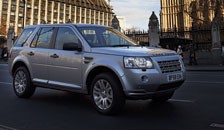Range Rovers will be emitting 140g/km of CO2 within 10 years as Land Rover steps up its efforts to build a more environmentally-friendly range.
Extensive use of lightweight materials such as aluminium and composites, plus the adoption of part and full-time hybrid drivetrains, will see the manufacturer slash emissions across its range.
A Range Rover TDV8 currently emits nearly 300g/km of CO2.
The same weight loss and technology will translate into a Freelander, or other small SUV, being offered with CO2 emissions of 100g/km within the same timeframe.
Murray Dietsch, director of Land Rover programmes, said: “The new challenge is sustainability – we have to reduce our environmental impact.
"We are investing £800 million over the next five years on environmental projects, but we have to do this without compromising our vehicles’ breadth of capabilities.”
Mr Dietsch was speaking as Land Rover launched the first phase in its e_Terrain Technologies programme – the Freelander TD4_e Stop/Start, a diesel model which automatically cuts the engine when the vehicle is at a halt in neutral, and restarts it when the clutch is depressed.
As a result, the new model, which goes on sale next May at prices unchanged from the current Freelander range, cuts CO2 emissions by 8% from 194g/km to 179g/km.
Average fuel economy rises from 37.7mpg to 42.2mpg.
Building on the stop-start technology, an improved version will be launched in a year’s time which can be used on larger engines, as well as automatic gearboxes.
Work is also underway on a diesel hybrid, a plug-in hybrid, a kinetic hybrid and a series hybrid which will use a small three-cylinder engine to recharge the battery packs rather than power the car.
It is this iteration of the hybrid which will result in the impressively low figures claimed.














Login to comment
Comments
No comments have been made yet.